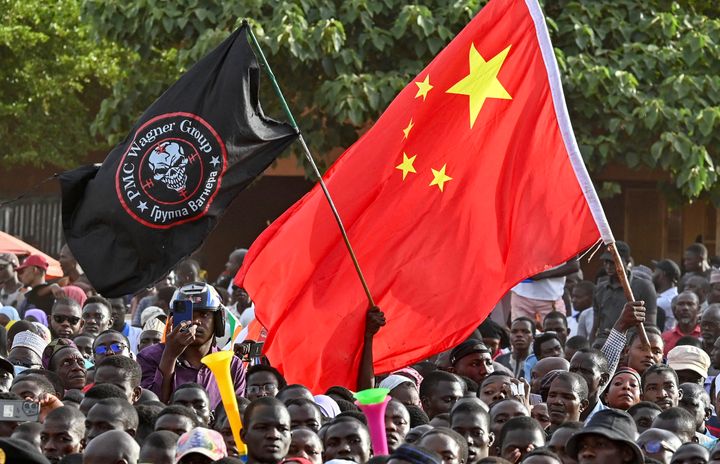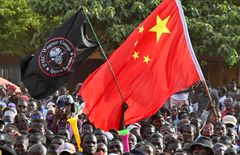Sahel elites must move away from 'zero-sum' policies, report urges
Los Angeles/DNA - A dual economic strategy focusing on domestic economic development and international partnerships to address the underlying challenges facing the Sahel region could help Burkina Faso, Mali, Niger and Sudan to build more resilient institutions and foster long-term development, a recently published report says.

The report by the Luskin School of Public Affairs at the University of California Los Angeles (UCLA) argues that the four countries should aim to transition away from relying exclusively on resource extraction. It attributes much of the challenges facing the four countries on unsustainable economic policies which focus on the export of raw materials.
Despite some improvements in terms of public goods provision - in particular regarding social and environmental public goods - these countries continue to face significant developmental challenges, ranking among the world's poorest.
Titled "Political Instability and Economic Development in the Sahel: Governance in Burkina Faso, Mali, Niger, and Sudan since 2000", the report provides a comprehensive analysis of the political instability and economic challenges facing the region. It evaluates scores from the Berggruen Governance Index (BGI), which is based on data from 2000 to 2019.
The four countries rank among the 20 lowest ranked nations on the United Nations' Human Development Index. All of them have experienced at least one coup or coup attempt since 2020. In Niger, the military took power in July 2023, in Burkina Faso in 2022, while the most recent coup in Mali took place in 2021. In Sudan, an ongoing violent power struggle between different military factions has caused the world's largest refugee crisis of the past year.
"This political upheaval is both the result and the cause of economic difficulty", the report states. "Scarcity breeds instability, which in turn makes development, investment, and growth more difficult, further fuelling dysfunctional governance, and deepening dependencies."
Before the coup in July 2023, Niger was seen as the last democratic partner of the Western industrialized nations in the region and an ally in the battle against terrorism and migration to Europe. Neighbouring countries Mali and Burkina Faso have also turned against the West and have improved relations with Russia.
The four Sahel states are highly dependent on overseas development aid (ODA), which makes them more susceptible to the policies of their donors. Colonial-era economic structures in the region have led to underdevelopment and inequality. The effects of this legacy can be felt until the present day and have resulted in a hugely uneven distribution of wealth as well as corruption, rent seeking and uneven infrastructure, the report finds.
The former colonial power France has scaled back its military engagement in the Sahel, as have the United States, the European Union, and the United Nations. Washington recently agreed to withdraw around 1,000 troops from Niger, while 12,000 UN peacekeepers are to leave Mali at the end of the year. The European Union Capacity Building Mission (EUCAP) in Niger is also forced to leave.
However, this leaves the door open for other players, the authors argue. Russia has become increasingly active, for example via the Wagner group. Trade between the country and the Sahel region has also benefitted from the coups. "China is also an increasingly important player due to its control over supply chains of critical minerals", the report adds.
In the Sahel region, most of the economic output comes from exporting raw materials. Gold, for example, accounts for 74 and 73 percent of export value in Burkina Faso and Mali respectively. Other commodities exported include oil, radioactive ores such as uranium, raw cotton, livestock or palm oil.
With elites competing over the unevenly distributed resources, politics becomes what the authors call "zero sum", with no-one trying to develop the economy further. This dynamic, they say, also serves as an explanation for the recent rash of coups in the region.
The climate crisis adds to the situation, according to the report. For instance, erratic rainfall exacerbates malnutrition, indirectly contributing to violence. On the other hand, the Sahel has a lot of potential for generating solar power. Partnerships with more developed countries or international donors could be particularly helpful to develop the sector.
"The public goods improvements we have witnessed in the Sahel are likely unsustainable in the context of low (and often declining) democratic accountability and a continued reliance of extractive export models and subsistence agriculture, in particular given the high fertility rates in the region, which are among the highest in the world", the report says.
If the states in the Sahel area emphasize domestic economic development, including a focus on the production of value-added goods and sustainable agriculture, they can build resilience and reduce dependency on external actors, the report concludes.
"The EU's best chance at facilitating strong connections and countering geopolitical competitors is by building strong economic ties and mutually beneficial relationships", it says. This is especially vital, it adds, in the face of the rising influence of Russia and China. +++
Further coverage by the Democracy News Alliance can be found in the DNA digital newsroom at https://www.presseportal.de/en/nr/174021
____________________________________________________________________________________
This text and the accompanying material (photos and graphics) is an offer from the Democracy News Alliance, a close co-operation between Agence France-Presse (AFP, France), Agenzia Nazionale Stampa Associata (ANSA, Italy), The Canadian Press (CP, Canada), Deutsche Presse-Agentur (dpa, Germany) and PA Media (PA, UK). All recipients can use this material without the need for a separate subscription agreement with one or more of the participating agencies. This includes the recipient's right to publish the material in own products.
The DNA content is an independent journalistic service that operates separately from the other services of the participating agencies. It is produced by editorial units that are not involved in the production of the agencies' main news services. Nevertheless, the editorial standards of the agencies and their assurance of completely independent, impartial and unbiased reporting also apply here.
Contacts
Christian Röwekamp, Democracy News Alliance
roewekamp.christian@dpa.com
Images

Subscribe to releases from Democracy News Alliance
Subscribe to all the latest releases from Democracy News Alliance by registering your e-mail address below. You can unsubscribe at any time.
Latest releases from Democracy News Alliance
Australia’s next government must mend structural cracks appearing in its political, economic and social foundation, report finds28.4.2025 08:58:31 EEST | Press release
Los Angeles/DNA - Australia boasts some of the world’s most sophisticated political institutions and one of its wealthiest economies. But this veneer of success masks deeper structural issues — and a “ticking time bomb” of overreliance on extractive industries must be addressed under Australia’s next government, a new report recommends.
Canada must reduce reliance on extractive industries and U.S. exports, report finds22.4.2025 09:58:00 EEST | Press release
Los Angeles/Ottawa (DNA) - From dissatisfaction with the Trudeau government to dissatisfaction with Trump’s policies — compounded by general anxiety around tariffs, the economy and a deteriorating relationship with the U.S. — navigating an economic downturn should be an immediate priority for Canada as it heads into a federal election, a new report recommends. In the long-term, however, it says Canada will need greater economic diversification and regional representation. “Although it is wealthy by global standards, Canada’s economy faces key vulnerabilities such as excessive reliance on extractive industries, shortages of critical goods like housing and heavy dependence on exports to the U.S.,” states a Canada BGI Report on the country’s governance performance, released a little more than ten days before the April 28 federal election. The report, based on the Berggruen Governance Index (BGI), was conducted by researchers from the Los Angeles-based Berggruen Institute think tank, the L
Germany "rested on its laurels" too long, report finds31.1.2025 14:45:07 EET | Press release
Los Angeles/DNA – High levels of governance have masked a slow decline in Germany, with political, economic, and social fractures "festering over years", a new scientific report released only weeks ahead of the February 23 parliamentary elections concludes.
Tunisia's struggling economy puts democracy at risk, study finds30.9.2024 14:58:52 EEST | Press release
Tunis/Los Angeles/DNA - Tunisia's political landscape is undergoing a perilous shift. Once celebrated as the Arab Spring’s democratic success story, the country now faces the grim possibility of sliding back into authoritarianism, a new study warns. As the October 2024 elections loom, analysts warn that President Kaïs Saïed may tighten his grip on power, threatening to reverse the hard-won gains from the 2011 Jasmine Revolution. But what has led Tunisia to this moment? And why has economic stagnation stifled its democratic aspirations? Researchers behind a new Berggruen Governance Index (BGI) report analyze what happened and what may happen next. In late 2010, mass protests erupted in Tunisia, setting the stage for the Jasmine Revolution. This movement, ignited by public outcry against the autocratic rule of Zine El Abidine Ben Ali, became the spark for the wider Arab Spring that swept through North Africa and the Middle East. While many neighboring nations soon experienced civil war o
Political uncertainty consumes France as country prepares for run-off vote5.7.2024 08:19:41 EEST | Press release
Paris (DNA) - As many candidates for the French National Assembly scramble to thwart a right-wing election victory, global governance researchers have released a new report detailing how the core issues plaguing France have been decades in the making.